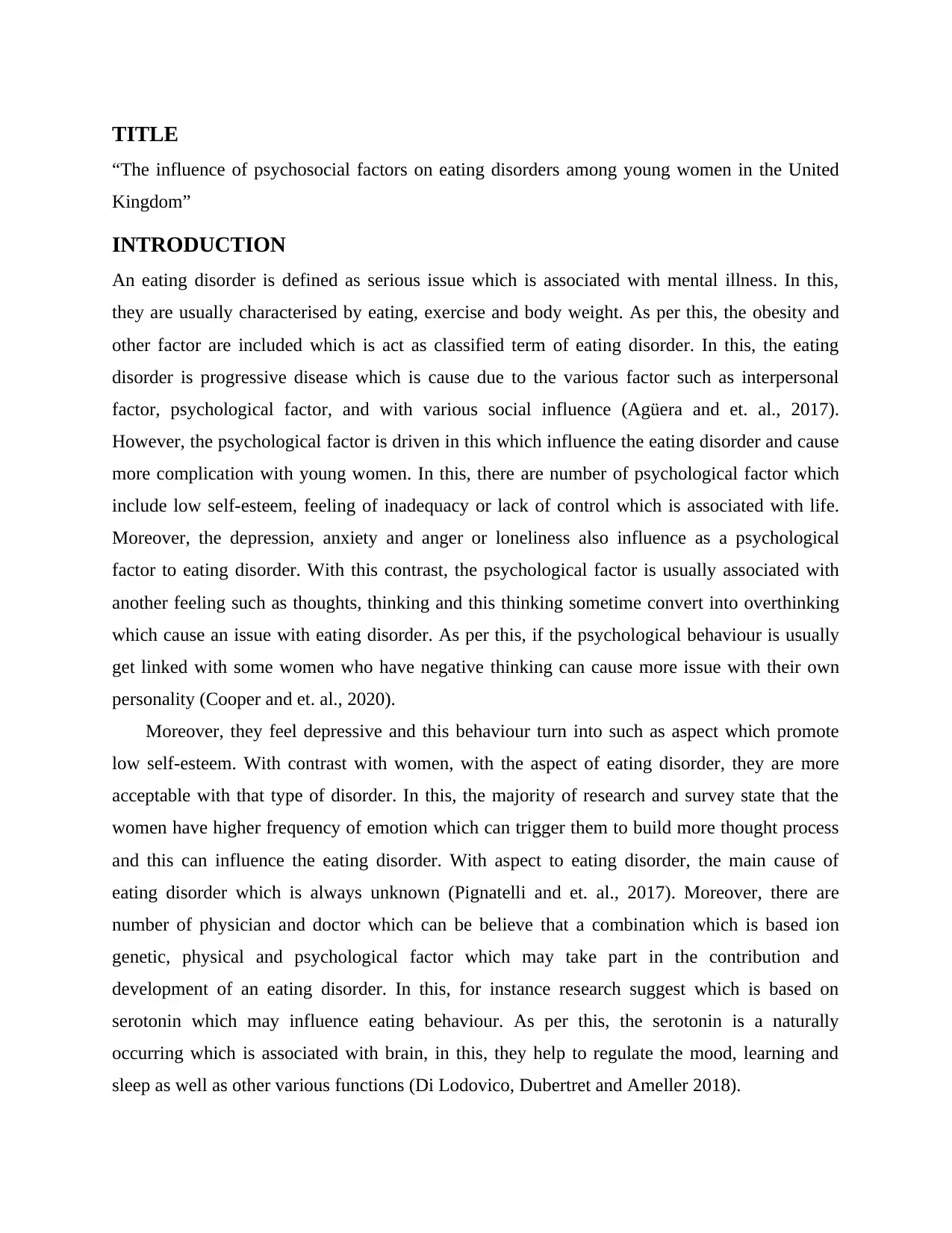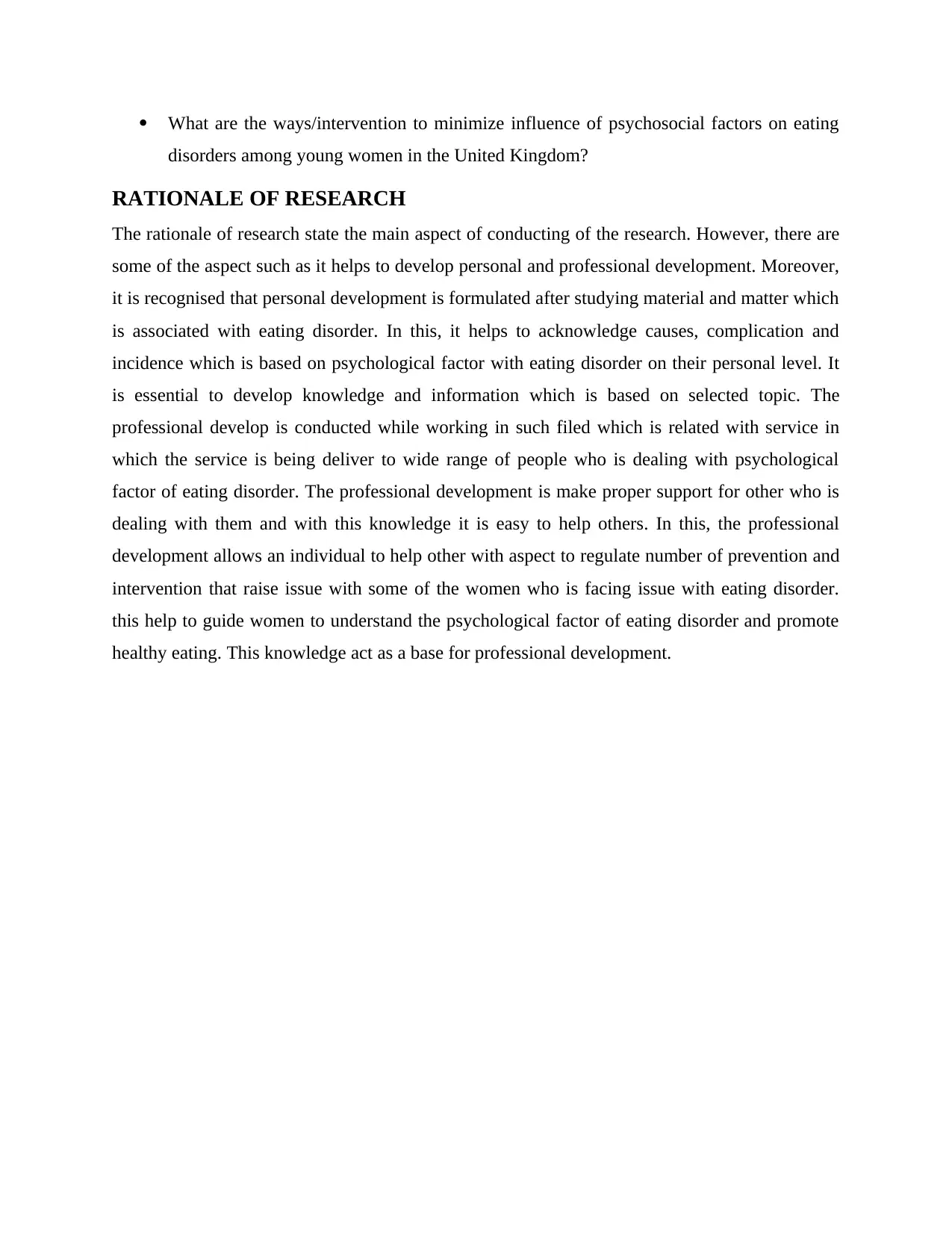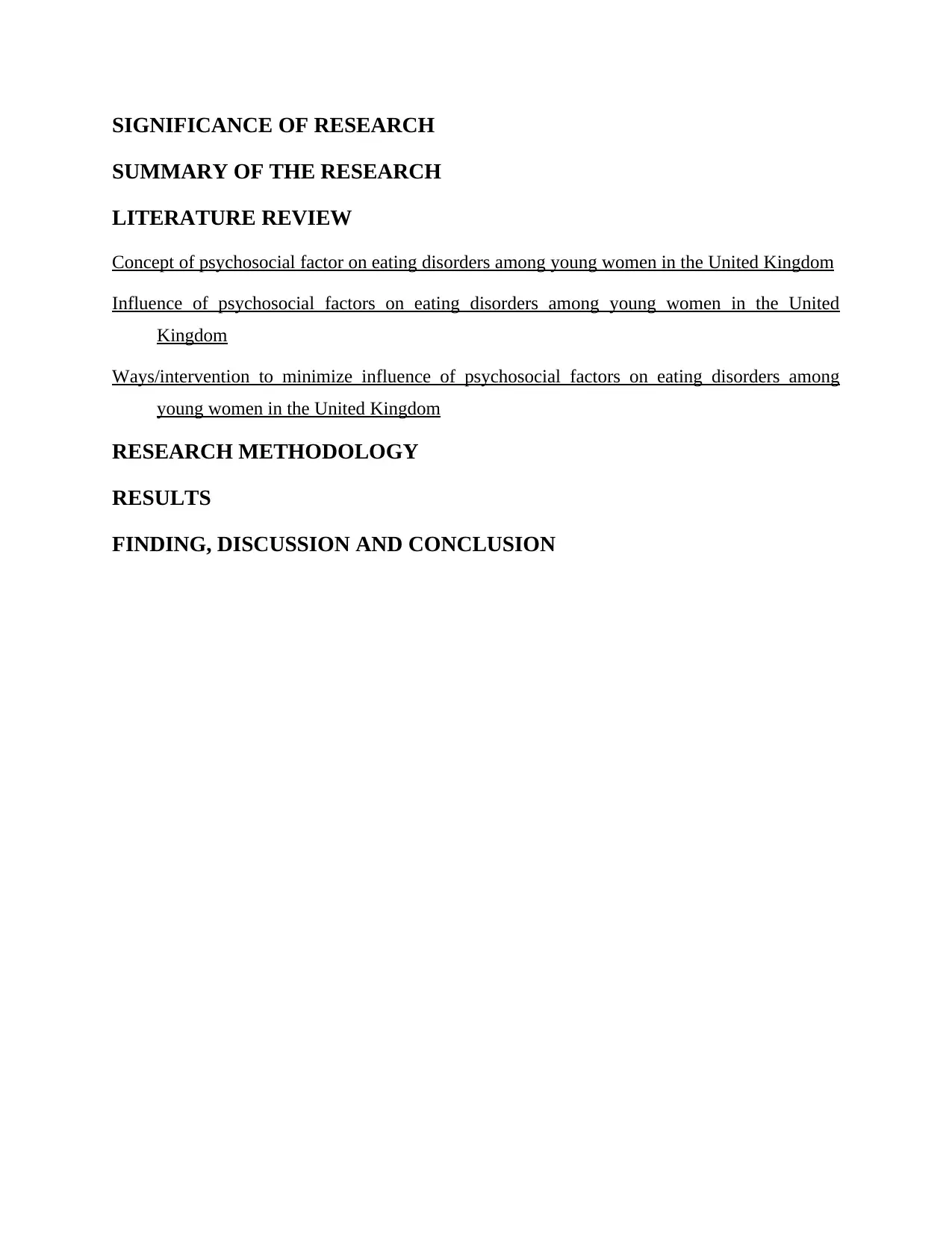Psychosocial Factors Influencing Eating Disorders in Young UK Women
VerifiedAdded on 2023/06/18
|8
|1473
|142
Report
AI Summary
This report examines the influence of psychosocial factors on eating disorders among young women in the United Kingdom. It begins by defining eating disorders and highlighting the role of psychological factors such as low self-esteem, anxiety, and depression. The report provides a historical background of eating disorders, noting early descriptions and the evolution of understanding these conditions. The research aims to analyze the impact of psychosocial factors, with objectives including understanding the concept, evaluating the influence, and examining interventions. The rationale emphasizes personal and professional development through knowledge of causes and complications. The report includes a literature review covering the concept of psychosocial factors, their influence, and potential interventions. It concludes with a discussion of findings and relevant references. Desklib provides past papers and solved assignments for students.

HEALTH AND
SOCIAL CARE
SOCIAL CARE
Paraphrase This Document
Need a fresh take? Get an instant paraphrase of this document with our AI Paraphraser

Table of Contents
TITLE..............................................................................................................................................3
INTRODUCTION...........................................................................................................................3
BACKGROUND.............................................................................................................................4
RESEARCH AIM............................................................................................................................4
RESEARCH OBJECTIVE..............................................................................................................4
RESEARCH QUESTION................................................................................................................4
RATIONALE OF RESEARCH.......................................................................................................5
SIGNIFICANCE OF RESEARCH..................................................................................................6
SUMMARY OF THE RESEARCH................................................................................................6
LITERATURE REVIEW................................................................................................................6
Concept of psychosocial factor on eating disorders among young women in the United
Kingdom.................................................................................................................................6
Influence of psychosocial factors on eating disorders among young women in the United
Kingdom.................................................................................................................................6
Ways/intervention to minimize influence of psychosocial factors on eating disorders among
young women in the United Kingdom...................................................................................6
RESEARCH METHODOLOGY.....................................................................................................6
RESULTS........................................................................................................................................6
FINDING, DISCUSSION AND CONCLUSION...........................................................................6
REFERENCES................................................................................................................................7
TITLE..............................................................................................................................................3
INTRODUCTION...........................................................................................................................3
BACKGROUND.............................................................................................................................4
RESEARCH AIM............................................................................................................................4
RESEARCH OBJECTIVE..............................................................................................................4
RESEARCH QUESTION................................................................................................................4
RATIONALE OF RESEARCH.......................................................................................................5
SIGNIFICANCE OF RESEARCH..................................................................................................6
SUMMARY OF THE RESEARCH................................................................................................6
LITERATURE REVIEW................................................................................................................6
Concept of psychosocial factor on eating disorders among young women in the United
Kingdom.................................................................................................................................6
Influence of psychosocial factors on eating disorders among young women in the United
Kingdom.................................................................................................................................6
Ways/intervention to minimize influence of psychosocial factors on eating disorders among
young women in the United Kingdom...................................................................................6
RESEARCH METHODOLOGY.....................................................................................................6
RESULTS........................................................................................................................................6
FINDING, DISCUSSION AND CONCLUSION...........................................................................6
REFERENCES................................................................................................................................7

TITLE
“The influence of psychosocial factors on eating disorders among young women in the United
Kingdom”
INTRODUCTION
An eating disorder is defined as serious issue which is associated with mental illness. In this,
they are usually characterised by eating, exercise and body weight. As per this, the obesity and
other factor are included which is act as classified term of eating disorder. In this, the eating
disorder is progressive disease which is cause due to the various factor such as interpersonal
factor, psychological factor, and with various social influence (Agüera and et. al., 2017).
However, the psychological factor is driven in this which influence the eating disorder and cause
more complication with young women. In this, there are number of psychological factor which
include low self-esteem, feeling of inadequacy or lack of control which is associated with life.
Moreover, the depression, anxiety and anger or loneliness also influence as a psychological
factor to eating disorder. With this contrast, the psychological factor is usually associated with
another feeling such as thoughts, thinking and this thinking sometime convert into overthinking
which cause an issue with eating disorder. As per this, if the psychological behaviour is usually
get linked with some women who have negative thinking can cause more issue with their own
personality (Cooper and et. al., 2020).
Moreover, they feel depressive and this behaviour turn into such as aspect which promote
low self-esteem. With contrast with women, with the aspect of eating disorder, they are more
acceptable with that type of disorder. In this, the majority of research and survey state that the
women have higher frequency of emotion which can trigger them to build more thought process
and this can influence the eating disorder. With aspect to eating disorder, the main cause of
eating disorder which is always unknown (Pignatelli and et. al., 2017). Moreover, there are
number of physician and doctor which can be believe that a combination which is based ion
genetic, physical and psychological factor which may take part in the contribution and
development of an eating disorder. In this, for instance research suggest which is based on
serotonin which may influence eating behaviour. As per this, the serotonin is a naturally
occurring which is associated with brain, in this, they help to regulate the mood, learning and
sleep as well as other various functions (Di Lodovico, Dubertret and Ameller 2018).
“The influence of psychosocial factors on eating disorders among young women in the United
Kingdom”
INTRODUCTION
An eating disorder is defined as serious issue which is associated with mental illness. In this,
they are usually characterised by eating, exercise and body weight. As per this, the obesity and
other factor are included which is act as classified term of eating disorder. In this, the eating
disorder is progressive disease which is cause due to the various factor such as interpersonal
factor, psychological factor, and with various social influence (Agüera and et. al., 2017).
However, the psychological factor is driven in this which influence the eating disorder and cause
more complication with young women. In this, there are number of psychological factor which
include low self-esteem, feeling of inadequacy or lack of control which is associated with life.
Moreover, the depression, anxiety and anger or loneliness also influence as a psychological
factor to eating disorder. With this contrast, the psychological factor is usually associated with
another feeling such as thoughts, thinking and this thinking sometime convert into overthinking
which cause an issue with eating disorder. As per this, if the psychological behaviour is usually
get linked with some women who have negative thinking can cause more issue with their own
personality (Cooper and et. al., 2020).
Moreover, they feel depressive and this behaviour turn into such as aspect which promote
low self-esteem. With contrast with women, with the aspect of eating disorder, they are more
acceptable with that type of disorder. In this, the majority of research and survey state that the
women have higher frequency of emotion which can trigger them to build more thought process
and this can influence the eating disorder. With aspect to eating disorder, the main cause of
eating disorder which is always unknown (Pignatelli and et. al., 2017). Moreover, there are
number of physician and doctor which can be believe that a combination which is based ion
genetic, physical and psychological factor which may take part in the contribution and
development of an eating disorder. In this, for instance research suggest which is based on
serotonin which may influence eating behaviour. As per this, the serotonin is a naturally
occurring which is associated with brain, in this, they help to regulate the mood, learning and
sleep as well as other various functions (Di Lodovico, Dubertret and Ameller 2018).
⊘ This is a preview!⊘
Do you want full access?
Subscribe today to unlock all pages.

Trusted by 1+ million students worldwide

BACKGROUND
The earliest historical description which is based on the people experiencing symptoms which is
permanent with the modern day fact of eating disorder. As per this, there are number of report
which is based on the different class which is based on the history. Moreover, there are two cases
of nervous consumption which is associated with the boy and girl (Geller and et. al., 2020).
These are considered as the earliest modern cases which is based on illness which is called as
anorexia nervosa. In this, the anorexia nervosa and bulimia nervosa is a part of eating disorder.
Moreover, psychoanalytic explain various of factor which is responsible for illness in eating
disorder due the genetic and biological process which may increase and enhance in number.
There is major difference between motivation for the refusal across the historical time period
may use to represent the some of the aspect in such a way to understand the disorder which help
to leave the people, in contrast to female, they are feeling unable and unwilling to eat due to
moderate change which occupied the behaviour and perforate the thought and thinking
(Galmiche and et. al., 2019).
RESEARCH AIM
“To analyse the influence of psychosocial factors on eating disorders among young women in the
United Kingdom”
RESEARCH OBJECTIVE
To understand the concept of psychosocial factor on eating disorders among young
women in the United Kingdom.
To evaluate the influence of psychosocial factors on eating disorders among young
women in the United Kingdom.
To examine the ways/intervention to minimize influence of psychosocial factors on
eating disorders among young women in the United Kingdom.
RESEARCH QUESTION
What are the concept of psychosocial factor on eating disorders among young women in
the United Kingdom?
What are the influence of psychosocial factors on eating disorders among young women
in the United Kingdom?
The earliest historical description which is based on the people experiencing symptoms which is
permanent with the modern day fact of eating disorder. As per this, there are number of report
which is based on the different class which is based on the history. Moreover, there are two cases
of nervous consumption which is associated with the boy and girl (Geller and et. al., 2020).
These are considered as the earliest modern cases which is based on illness which is called as
anorexia nervosa. In this, the anorexia nervosa and bulimia nervosa is a part of eating disorder.
Moreover, psychoanalytic explain various of factor which is responsible for illness in eating
disorder due the genetic and biological process which may increase and enhance in number.
There is major difference between motivation for the refusal across the historical time period
may use to represent the some of the aspect in such a way to understand the disorder which help
to leave the people, in contrast to female, they are feeling unable and unwilling to eat due to
moderate change which occupied the behaviour and perforate the thought and thinking
(Galmiche and et. al., 2019).
RESEARCH AIM
“To analyse the influence of psychosocial factors on eating disorders among young women in the
United Kingdom”
RESEARCH OBJECTIVE
To understand the concept of psychosocial factor on eating disorders among young
women in the United Kingdom.
To evaluate the influence of psychosocial factors on eating disorders among young
women in the United Kingdom.
To examine the ways/intervention to minimize influence of psychosocial factors on
eating disorders among young women in the United Kingdom.
RESEARCH QUESTION
What are the concept of psychosocial factor on eating disorders among young women in
the United Kingdom?
What are the influence of psychosocial factors on eating disorders among young women
in the United Kingdom?
Paraphrase This Document
Need a fresh take? Get an instant paraphrase of this document with our AI Paraphraser

What are the ways/intervention to minimize influence of psychosocial factors on eating
disorders among young women in the United Kingdom?
RATIONALE OF RESEARCH
The rationale of research state the main aspect of conducting of the research. However, there are
some of the aspect such as it helps to develop personal and professional development. Moreover,
it is recognised that personal development is formulated after studying material and matter which
is associated with eating disorder. In this, it helps to acknowledge causes, complication and
incidence which is based on psychological factor with eating disorder on their personal level. It
is essential to develop knowledge and information which is based on selected topic. The
professional develop is conducted while working in such filed which is related with service in
which the service is being deliver to wide range of people who is dealing with psychological
factor of eating disorder. The professional development is make proper support for other who is
dealing with them and with this knowledge it is easy to help others. In this, the professional
development allows an individual to help other with aspect to regulate number of prevention and
intervention that raise issue with some of the women who is facing issue with eating disorder.
this help to guide women to understand the psychological factor of eating disorder and promote
healthy eating. This knowledge act as a base for professional development.
disorders among young women in the United Kingdom?
RATIONALE OF RESEARCH
The rationale of research state the main aspect of conducting of the research. However, there are
some of the aspect such as it helps to develop personal and professional development. Moreover,
it is recognised that personal development is formulated after studying material and matter which
is associated with eating disorder. In this, it helps to acknowledge causes, complication and
incidence which is based on psychological factor with eating disorder on their personal level. It
is essential to develop knowledge and information which is based on selected topic. The
professional develop is conducted while working in such filed which is related with service in
which the service is being deliver to wide range of people who is dealing with psychological
factor of eating disorder. The professional development is make proper support for other who is
dealing with them and with this knowledge it is easy to help others. In this, the professional
development allows an individual to help other with aspect to regulate number of prevention and
intervention that raise issue with some of the women who is facing issue with eating disorder.
this help to guide women to understand the psychological factor of eating disorder and promote
healthy eating. This knowledge act as a base for professional development.

SIGNIFICANCE OF RESEARCH
SUMMARY OF THE RESEARCH
LITERATURE REVIEW
Concept of psychosocial factor on eating disorders among young women in the United Kingdom
Influence of psychosocial factors on eating disorders among young women in the United
Kingdom
Ways/intervention to minimize influence of psychosocial factors on eating disorders among
young women in the United Kingdom
RESEARCH METHODOLOGY
RESULTS
FINDING, DISCUSSION AND CONCLUSION
SUMMARY OF THE RESEARCH
LITERATURE REVIEW
Concept of psychosocial factor on eating disorders among young women in the United Kingdom
Influence of psychosocial factors on eating disorders among young women in the United
Kingdom
Ways/intervention to minimize influence of psychosocial factors on eating disorders among
young women in the United Kingdom
RESEARCH METHODOLOGY
RESULTS
FINDING, DISCUSSION AND CONCLUSION
⊘ This is a preview!⊘
Do you want full access?
Subscribe today to unlock all pages.

Trusted by 1+ million students worldwide

REFERENCES
Books and Journals
Agüera and et. al., 2017. Short‐term treatment outcomes and dropout risk in men and women
with eating disorders. European Eating Disorders Review, 25(4), pp.293-301.
Cooper and et. al., 2020. Eating disorders during the COVID-19 pandemic and quarantine: an
overview of risks and recommendations for treatment and early intervention. Eating
disorders, pp.1-23.
Di Lodovico, L., Dubertret, C. and Ameller, A., 2018. Vulnerability to exercise addiction, socio-
demographic, behavioral and psychological characteristics of runners at risk for eating
disorders. Comprehensive psychiatry, 81, pp.48-52.
Galmiche and et. al., 2019. Prevalence of eating disorders over the 2000–2018 period: a
systematic literature review. The American journal of clinical nutrition, 109(5), pp.1402-
1413.
Geller and et. al., 2020. Exploring body image, strength of faith, and media exposure among
three denominations of Jewish women. Current Psychology, 39(5), pp.1774-1784.
Pignatelli and et. al., 2017. Childhood neglect in eating disorders: A systematic review and meta-
analysis. Journal of Trauma & Dissociation, 18(1), pp.100-115.
Online
Eating Disorders: Causes and Risk Factors, 2017 [Online] Available through: <
https://www.healthline.com/health/eating-disorders-causes-risk-factors>
History of Eating Disorders, 2020 [Online] Available through: <
https://www.verywellmind.com/history-of-eating-disorders-4768486>
Books and Journals
Agüera and et. al., 2017. Short‐term treatment outcomes and dropout risk in men and women
with eating disorders. European Eating Disorders Review, 25(4), pp.293-301.
Cooper and et. al., 2020. Eating disorders during the COVID-19 pandemic and quarantine: an
overview of risks and recommendations for treatment and early intervention. Eating
disorders, pp.1-23.
Di Lodovico, L., Dubertret, C. and Ameller, A., 2018. Vulnerability to exercise addiction, socio-
demographic, behavioral and psychological characteristics of runners at risk for eating
disorders. Comprehensive psychiatry, 81, pp.48-52.
Galmiche and et. al., 2019. Prevalence of eating disorders over the 2000–2018 period: a
systematic literature review. The American journal of clinical nutrition, 109(5), pp.1402-
1413.
Geller and et. al., 2020. Exploring body image, strength of faith, and media exposure among
three denominations of Jewish women. Current Psychology, 39(5), pp.1774-1784.
Pignatelli and et. al., 2017. Childhood neglect in eating disorders: A systematic review and meta-
analysis. Journal of Trauma & Dissociation, 18(1), pp.100-115.
Online
Eating Disorders: Causes and Risk Factors, 2017 [Online] Available through: <
https://www.healthline.com/health/eating-disorders-causes-risk-factors>
History of Eating Disorders, 2020 [Online] Available through: <
https://www.verywellmind.com/history-of-eating-disorders-4768486>
Paraphrase This Document
Need a fresh take? Get an instant paraphrase of this document with our AI Paraphraser

1 out of 8
Related Documents
Your All-in-One AI-Powered Toolkit for Academic Success.
+13062052269
info@desklib.com
Available 24*7 on WhatsApp / Email
![[object Object]](/_next/static/media/star-bottom.7253800d.svg)
Unlock your academic potential
Copyright © 2020–2026 A2Z Services. All Rights Reserved. Developed and managed by ZUCOL.




